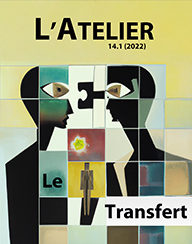Radiophonic Transference in Antonin Artaud’s Pour en finir avec le jugement de dieu
Résumé
This article explains how Artaud constructs a field of radiophonic transference to reconstitute the body beyond its destruction by language. We situate our argument at the level of the unconscious, or at the level of the artwork considered through its conditions of possibility. A close reading of the text of the radio play emphasizes the dissonant elements of language at work (glossolalia, screams, cacophony, etc.) as well as the thematization of jouissance. We also give attention to the way radio-voice is used to enact one of Artaud’s leitmotifs: disincarnation. He theorized a disincarnation that contains the body, and, by attributing the body’s material and affective force to its separation from itself, he was able to challenge the metaphysical connotations attached to radio. Artaud’s central concern–lived as a constant psychic threat–that language, as a medium, produces the body as a dead body, as a mere effect of language, reappears in radio as a problem of how to express the body in a seemingly bodiless medium. Artaud’s search for the body doesn’t lead him somewhere “beyond” language, outside of the field of signification where pure affects could be located. Rather, it leads him somewhere deep within it, where the body is reconstituted in relation, as Artaud points out, to both the infini and the infime.
Téléchargements
Publiée
Numéro
Rubrique
Licence
-
L’envoi spontané d’un article à la rédaction de L’Atelier implique l’autorisation de publication et la cession des droits dans les limites établies par la loi de propriété intellectuelle.
-
L’Atelier conserve les droits de reproduction des articles publiés, quelque soit le support : internet, CD ROM, réimpression, photocopie, etc.
-
L’auteur conserve le droit de publier ultérieurement son article déjà paru dans L’Atelier avec la seule obligation de mentionner le nom de la revue comme source de la première publication.


